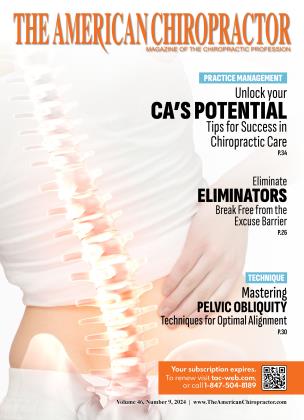Balancing Personal and Professional Life
PERSPECTIVE
Creating Harmony without Compromise
Dr. Daniel H. Dahan
IN TODAY’S FAST-PACED WORLD, striking a balance between one’s personal and professional life can seem like an impossible task. The pressures of managing a clinic, along with personal duties and desires, can create a quandary in which one element of life may eclipse the other. However, achieving a balance is not only feasible but necessary for overall well-being and long-term success.
As a happily married father of seven children with an extensive traveling schedule for a consultant teaching seminar nationally, I am grateful that I was well advised by my mentor early in my career to establish clear limits and a strict regimen of habits to safeguard my successes and avoid any potential setbacks.
Here are some ideas I’d like to share with you from my experience: Understanding Balance
Balance does not imply that work and personal life are always equally distributed in terms of time and energy. Rather, it entails a dynamic balance in which each part of life receives the attention it requires based on priorities and circumstances. It’s about handling
obligations well without being overwhelmed or ignoring one’s own needs. A doctor’s passionate desire to help patients often means they neglect to pay attention to other responsibilities, which always ends up causing unwarranted stress. Therefore, setting priorities is critical.
Setting Priorities
The initial step is to establish clear priorities. Identify what is most important in both your personal and professional lives. This should include spending quality time with your family, as well as your health and well-being, your personal interests, and your professional development. Knowing your priorities enables you to allocate your time appropriately, expand your energy effectively, and be able to make educated decisions when conflicts emerge.
Effective Time Management
Another pressing task in maintaining balance requires effective time management. Thankfully, today’s technological advancement offers a wide variety of calendars, to-do lists, and scheduling applications that can all help you plan your day more effectively. You will need to prioritize projects based on their due dates and relevance. To truly succeed, you also need to be realistic about what you can do in a given time frame. To amplify your options, you should learn to delegate chores whenever possible, both at work and at home. This will also minimize fatigue and guarantee that all responsibilities are fulfilled.
Setting Boundaries
Here is another important point to recognize. Irrespective of your wish or needs, your time cannot be expended. Consequently, setting boundaries is vital for keeping a balance. Learn to say “no” when required, whether it’s taking on an extrajob or responsibilities that take up your personal time. I am not suggesting recoiling from your obligations; be adaptable to unanticipated developments in both personal and professional settings. Take into consideration that sometimes changes are required to meet urgent requirements or possibilities.
“The initial step is to establish clear priorities. Identify what is most important in both your personal and professional lives.”
Continuous adjustment
As much as doctors feel that they are experts on health care, doctors often neglect to take care of their physical, mental, and emotional needs because of their busy schedules and numerous responsibilities, which is critical in finding balance. This includes incorporating regular exercise, enough
sleep, and healthy eating habits into a daily routine. One must also make time for activities that bring you joy and relaxation, whether they involve spending time with loved ones, pursuing a hobby, or simply appreciating nature. This mindfulness and self-care habit will help you reduce stress and focus better.
Malleability
One of the most valuable virtues I admire is the value of flexibility. Achieving equilibrium is a continuous process that necessitates frequent evaluation and adjustment. Indeed, you must regularly evaluate how well you manage your time and energy in various aspects of your life. You must be willing to adjust your routines or commitments if circumstances change. Remember that balance is fluid and may require various techniques during hectic periods or times of personal growth.
Practical Connections
Effective communication is essential for balancing personal and professional responsibilities. Maintain open channels of communication with your family, friends, and coworkers regarding your priorities and constraints. Seek help when you need it, whether from a partner, mentor, or trusted coworker.
Sharing duties and requesting help when overwhelmed might help you avoid feelings of isolation and burnout
Conclusion
Balancing your personal and professional life without compromising entails finding harmony in the midst of competing pressures. Actively seeking the positive aspect or opportunity in any given situation, believing deeply in a supreme being’s ultimate goodness and immanent presence, and living with purpose, responsibility, and meaning provide the ultimate radical therapy for a good life.
Individuals can handle the difficulties of modem life while cultivating personal fulfillment and professional success by having clear priorities, managing time effectively, establishing boundaries, and prioritizing self-care. Accept the journey to balance as a constant process of progress and self-discovery, resulting in a meaningful and sustainable existence in all aspects.
Dr. Daniel H. Dahan is recognized as the nation’s leading expert authority on medical integration. He is the senior consultant for Consultants Of America, which manages over 1,250 offices in 45 states. He is also the author of The Ultimate You: 356 Ways You ~ Can Improve Your Life; and has 52,000 daily listeners on his free “Daily Wisdom’ podcasts. Learn more atwww.dahan.com, send an email to [email protected], or call (888)67-DAHAN. Scan the QR Code to see our videos from this article!
 View Full Issue
View Full Issue






